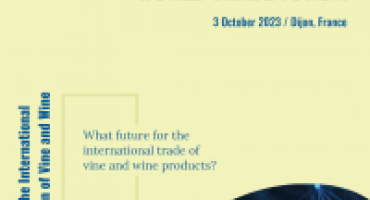International organisations, governments and the sector met in Dijon for two days to discuss the impact of non-tariff measures on the vine and wine sector


The International Organisation of Vine and Wine organised on October 3rd in Dijon, France, the first edition of the Vine and Wine World Trade Forum (VWWTF), which gathered 170 people from 35 different nationalities.
Under the theme of “What future for the international trade of vine and wine products? Between sustainability challenges and non-tariff measures” for this first edition of the VWWTF, the OIV aims at the creation of a forum of reflection and exchange on global trade dedicated to facilitating global trade in the vitivinicultural sector, by fostering cooperation, sharing knowledge and collaboration among producers, distributing stakeholders and international organizations (IO) to address the major issues and trade challenges for vitivinicultural products.
Multilateralism is the place
Experts from the OIV, the European Commission, Embassies, the World Trade Or-ganisation, UNCTAD, International Trade Centre, Wine Origins Alliance, FIVS and the private sector attended the conference. The forum facilitated the exchanges, gave examples of both tariff and non-tariff measures.
Participants agreed in the importance of fighting against the fragmentation of the sector, climate risks and sustainability in the future of trade. The multilateral trading system is the place for achieving transparency, cooperative dialogue, and the prevention of disputes on regulations adopted for legitimate policy objectives.
BACKGROUND
The forum was organised trough an opening session and four sessions. Firstly the opening session with the participation of Mr. Luigi Moio OIV President, Mr Olivier Becht, France Minister for Foreign Trade and Attractiveness and Mr. Jean-Marie Paugam Deputy Director General of the World Trade Organisation.
The opening session was followed by three technical sessions which included presentations and discussion around specific topics on international trade and vitivinicultural sector:
-
Session 1: on the topic of “NON-TARIFFS MEASURES: BARRIERS OR CATALYST TO THE VINE AND WINE TRADE?”
-
Session 2: about “SUSTAINABILITY OBJECTIVES AND TRADE FLUIDITY” and,
-
Session 3 on “TOOLS TO ASSESS THE IMPACT OF NTMs AND MITIGATE SPECIFIC BARRIERS OF THE VINE AND WINE SECTOR”.
Following these three sessions the Forum welcomed a fourth session defining an ACTION PLAN for the OIV regarding the issues of trade for the vitivinicultural sector.
The Action Plan should work to reinforce the OIV missions in the following areas:
- Standards (OIV) harmonisation: To enhance the (key) role of the OIV regarding the harmonisation of standards in the vitivinicultural sector as a tool to facilitate access to markets for vitivinicultural products.
- Market Access and Trade Facilitation: To provide a platform for networking and discussion, enabling the sector and its stakeholders to strengthen existing partnerships and commercial agreements, or promote new ones if necessary.
- Cooperation: To stimulate collaboration among sector stakeholders, promoting the sharing of knowledge, best practices, and sustainable solutions related to trade and market access.
- Training/Educating: To train/educate players and stakeholders about the challenges and opportunities of vine and wine trade, the identification of measures affecting trade, including strategies for market access, trade policy dynamics, and international market trends present in the vitivinicultural sector.
All the actors agreed in the creation of a working group to oversee the planning and implementation of the Forum and its Action Plan.
